Greed
Sloth
Lust
Pride
Envy
Wrath
The seven deadly sins. A list of characteristics that evil, unwholesome. Spritual flaws that can invoke wickedness in a person, or bring about their own downfall.
The concept finds itself rooted in the Bible. Our own faults and sins drive us towards misdeeds, and cause us to betray God again and again. Contrary to popular belief, the seven deadly sins are never specifically mentioned in the Good Book. The closest the Bible ever comes mentioning them is a passage in the book of Proverbs which describes certain human behaviors that are not good personality traits, each sharing similarities with the seven deadly sins we know today.
It was religious scholars and teachers, and the work of certain artists (such as Dante, author of the Divine Comedy), that pulled the information from the Bible and molded it into a list of deadly sins, which was then refined into our modern interpretation.
What are the seven deadly sins? Obviously, they are human traits that are evil, or at least not good. The term "sin" is defined by Dictionary.com as, 1.) transgression of divine law, 2.) (...) willful or deliberate violation of some religious or moral principle, 3.) any reprehensible or regrettable action, behavior, lapse, etc.; great fault or offense. The "deadly" part is also interesting. It can be deadly toward the person the sin is being committed against, such as wrath, but it can also be deadly toward the committer.
Keep in mind that this isn't necessarily deadly in the literal sense. The seven deadly sins are more like a tragic flaw. For those of you who don't remember tragic flaws from literature class, it is a characteristic that ultimately brings about a person's downfall. For example, in Julius Caesar, Brutus throws himself on his own sword when his army falls. As a result, his pride became his tragic flaw. It's interesting to note that the Greek name for "tragic flaw" is "hamartia," which is sometimes interpreted as, "sin." As in, the seven deadly sins, perhaps?
The seven deadly sins can also be motivation for doing evil to others, especially for the sins which are self serving. A person who is greedy might do whatever it takes to get what he wants, even if that means stepping on others in the process. Somebody who is envious of another may give in to their jeoulousy and steal or harm the person who is the target of their feelings.
The seven deadly sins are no strangers to popular culture. They've gotten their share of attention in literature. As a I said, most notable is in Dante's Inferno, part of the Divine Comedy. Anime and Manga fans might recognize them as the names of the homunculi from Full Metal Alchemist. They also served as major plot device (and the movie's namesake) in the the detective film, Se7en. Villains upon villains have been inspired by these wicked character traits.
Which brings me to the main part of the blog. I've chosen from an elite group of the some of the most well known villains in recent and modern history: The Disney Villains. Everybody has a favorite Disney movie. Everybody has seen the cartoons films. Disney also has some of the most memorable and diverse bad guys in fiction ever. There are almost always one hundred percent evil, and certainly memorable.
I have chosen seven Disney villains, some well-known and others not so much, which I believe personify the seven deadly sins. In some cases it is their motivation; in others, their hamartia. But in all cases, these villains have come to exemplify the evil the comes with these seven traits that are the bane of humankind.
Gluttony - Kaa
The Jungle Book, 1967
Gluttony. Overindulgence in pleasure, especially food. Gluttony is one that is easy to miss. It can fly under the radar quite easily. Unlike greed or wrath, gluttony is often subtle and overlookable in all but the most extreme cases. It's easy to see how the other deadly sins can be bad, but what's so evil about eating?
Nothing, if it's kept to the norm. Food is essential for human life. It is the overindulgence in such things that is detrimental. Indeed, it's extremely apparent in the United States today. Obesity is an epidemic. Health problems run rampant as American's gobble of tons of food that is unhealthy, yet continue to do so. It's also a mark of the rich. Like greed, those obsessed with worldly possessions indulge in gluttony. Fine dining, five hundred dollar meals, eating food that is unnecessary, just because they can. Mindless self indulgence.
Gluttony:
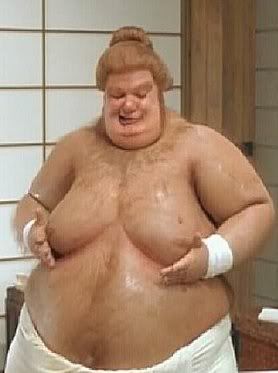
Kaa, from the Jungle Book, is not the main villain of the story. He is more of a comedic character, and secondary nemesis. His plots are foiled effortlessly and he never amounts to anything more than minor threat. Regardless of his success, however, he still attempts to murder the main character.

Kaa isn't fat. In fact, he's quite skinny, being a snake and all. But he's still indulgent. Kaa's entire motivation is based on gluttony. Upon seeing Mowgli, the main character, Kaa becomes obsessed with eating him. Mowgli is a human, a rare treat. In a forrest filled with animals for the snake to munch on, Kaa instead chooses to indulge in the rare delicacy of man. It becomes his ambition, to stuff his face with that yummy little boy meat. Kaa's sin is gluttony.
Greed - Medua
The Rescuers, 1977
Greed is quite possible the most common deadly sin. The thirst for wealth, for money, for power. The desire to have torrents of unnecessary worldly goods. It's a common story. Even among normal people, who hasn't, at least once in their life, wished they were rich? I'd be lying if I said I never thought about it. But Greed goes beyond that. It motivates people to get what they want, but not in healthy, ambitious kind of way. In a selfish way that hurts themselves and those around them, striving for riches above all else.
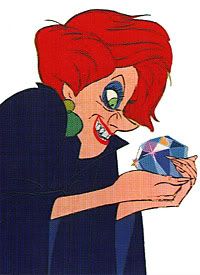
I'm not quite sure is Medusa is the absolute best choice. As stated, greed is quite possibly the most common motivator for a villain. There are several other obvious choices. Cruella de Vil comes to mind. I chose Medusa because not only is she driven by greed, and entirely by greed, but the actions carries out because of it go well beyond that of simply being mean.
Perhaps the most deplorable aspect is that her actions are carried out against a child. Unlike Kaa, who was comic relief, Madame Medusa subjects a little girl to pain and torture. On the hunt for a legendary diamond, Madame Medusa kidnaps a young orphan girl named Penny. She takes Penny to an island in the bayou where she forces the poor girl to search the caves and swamps for the jewel. Among her mistreatments of Penny include sicking her pet alligators on the poor girl, and leaving her under ther supervision of her sidekick, Mr. Snoops. Snoops is a bumbling idiot, but he's also fairly creepy. While you'd never see it implied in a Disney movie, it wouldn't surprise me if Snoops was a child molester. And here is Penny left alone with him. Would be reasonable to believe that he hasn't had his way with her?
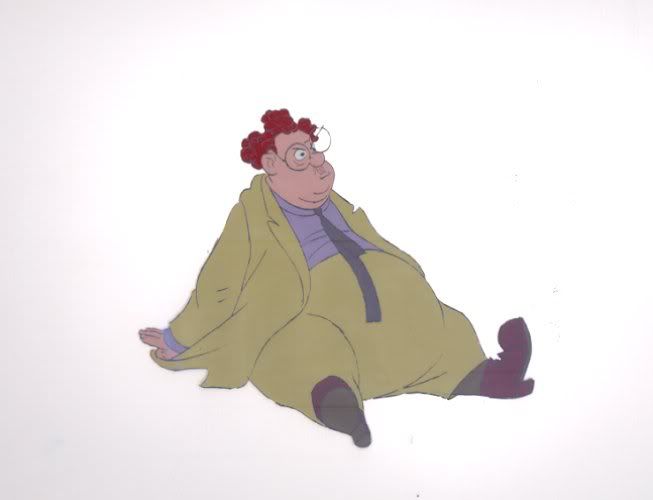
Tell me this guy doesn't look like a pedophile.
Medusa's ambition culminates when she forces Penny into a cavern. Penny finds the diamond, but the tide waters are rushing in and filling the cavern. The diamond is stuck and there's no way Penny can remove it before the catacomb is flooded. In spite of this, Medusa refuses to allow Penny to return to the surface until she has gotten the diamond. Nothing is as important to her as her impending riches, not even Penny's life. It's greed at it's worst.
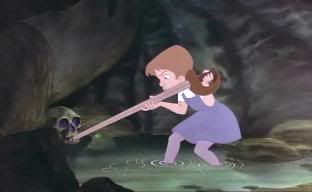
She also refuses to let Snoops even look at the diamond, despite having promised him a share.
Eventually, Penny escapes with the help of some talking mice and foils Madame Medusa, but not before Medusa tries to shoot her. Yes, shoot her.
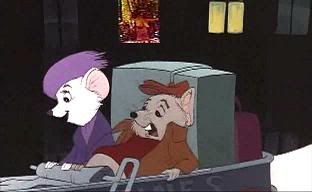
Aww, isn't that cute? The mice are riding on the back of HOLY SHIT WHAT IS THAT?
Sloth - Honest John
Pinocchio, 1940
Pinocchio doesn't skimp on the sins. The entire movie is based around a naive young boy dealing with temptation. An entire section of the movie pits Pinocchio on Pleasure Island, the very epitome of hedonism. Sins of all kinds, not just seven we're talking about here, run rampant through the entire film.
Pinocchio doesn't really have a single main antagonist, as there are multiple conflicts all throughout, but if it did, the bad guy would be Honest John, the fox.
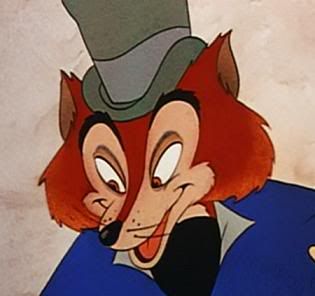
Honest John is anything but. He, along with his friend Gideon the cat, is the catalyst for all of Pinocchio's hardships. He first convinces poor Pinoch to join the puppet show, which ends up getting him locked in a cage. Then he goes a step further and actually sells Pinocchio into slavery as donkey, while convincing our marionette friend that he's doing him a favor. Pinocchio heads off to Pleasure Island, completely oblivious that he will end up turning into a jackass (in more ways than one.)
Honest John is the ultimate con man. He possess a variety of unsavory characteristics and could probably be mapped to multiple deadly sins. The reason he falls under sloth is his motivation. Not even an active motivation, at that. Like all con men, John wants the easy way out. Rather than working hard, being a good person, and earning what he has, John instead takes advantage of people and tricks little boys for a quick buck.
Sloth is usually implies laziness, like a couch potatoe. In fact, in early versions of the deadly sin list, it was actually "despair." I think John, as a con man, exemplifies sloth in another way. He is a slacker. Instead of getting a job and earning his pay, he instead tricks an innocent young Pinocchio and sells him for money. Like all gamblers and con men, he harms others to get what he wants, just because he doesn't want to put in the elbow grease and get it ethically and lawfully.
Lust - Frollo
The Hunchback of Notre Dame, 1996
Lust isn't exactly a subject you'd expect to see in a Disney film. Lust is an attraction to somebody, but not like a crush or romantic way. Not even a personal way. Lust is raw sexual desire. No love, just an urge in the most basic, animalistic sense.
In a society where sexuality is glorified, it might be hard to comprehend why lust is so bad. To lust is objectify another person. It is also delve into one's primality and cast aside the things which set us apart from beasts. Sex is both highly emotional and romantic, and at the same time, kind of gross if you think about. I mean, she PEEs out of that thing, for crying out loud! Lust is not making love to your faithful partner, it is raw and indifferent. It strips away the sensuality, the sprituality, from a relationship and embraces the nitty gritty.
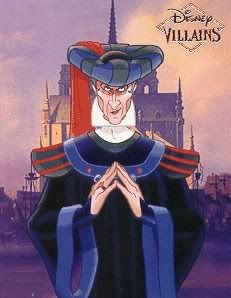
As a church leader, Frollo knows this quite well. He understands sin. Yet he is still human, and not resistant to a male's biological wiring. He, like all people, is apt to imperfection once in a while. So in spite of his religious beliefs, he quickly develops a crush on the beautiful gypsy woman, Esmeralda. However, as a man of the church, he knows that lusting is wrong, and begins to resent the her making him feel the way he does.
Don't get me wrong, Frollo is a grade-a douchebag right from the beginning. Attempting to throw a baby down a well, then imprisoning it in a tower for its whole life just because it's a less-than-aesthetically-pleasing isn't exactly a nice thing to do. But when lust enters the picture, the proverbial crap hits the metaphorical fan.
The more Frollo lusts after Esmeralda, the more he hates her. The angrier he gets, the more he tries to destroy her and her people. This strikes a nerve with Quasimodo and Phoebus, who have also taken a liking to her, ushering even more chaos. In crescendo of pure rage, Frollo gives in to both his lust and his hatred, vowing to first have his way with Esmeralda, then kill her.
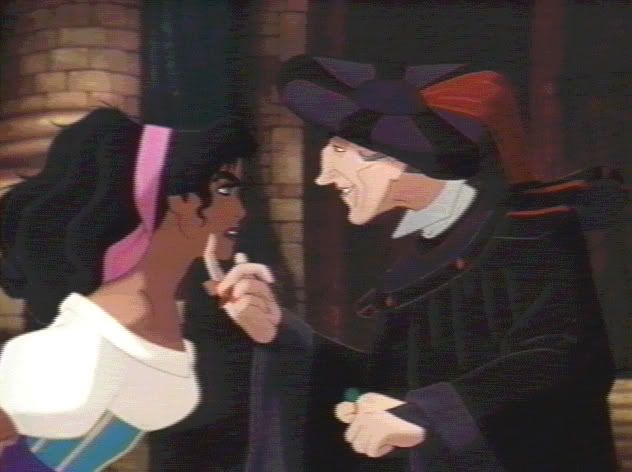
As he sinks into spiritual oblivion, Frollo becomes such a perversion of all that is good and righteous about the church that even the structure itself turns its back on him. In the climactic fight scene on top of the cathedral while the city burns below, and act of seeming divine intervention sends him hurtling to his doom.
Frollo is not evil for the sake of being evil. He is not a comedic or light villain. Frollo is quite possibly the most adult, most serious villain in any Disney movie ever.
Pride - The Queen
Snow White and Seven Dwarves, 1937
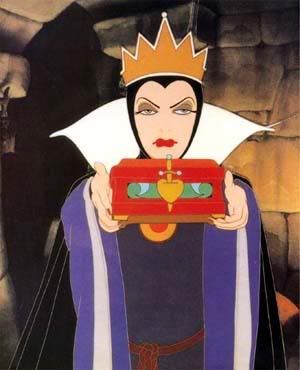
Mirror, mirror, on the wall, who's the fairest one of all? Not you, bitch.
With Walt Disney's animated feature length film, they crafted the epitome of pride. The Queen is a living exercise in vanity. She fancies herself better than all else. She keeps a magic mirror, which she uses to stroke her ego on a daily basis. She is self-obsessed and maniacal, possessing pride not just to the point of arrogance, but into sheer wickedness.
When looking at pride as a sin, it's important to realize how. That's not to say that one shouldn't feel proud of themself upon doing a good job. Excessive pride, however, can ruin a person. It can cause them to think too highly of themself, becoming vanity. Or it can lead to a misplaced sense of honor or entitlement which interferes with the well being of one's self, or others.
In the Queen's case, it's both. When one day the mirror tells her that she is not the fairest in the land, and the title in fact belongs to Snow White, the Queen becomes insulted. Her pride floods any rationality that she may have harbored and she chooses to kill Snow White. When a first assassination attempt fails, she even goes so far as to cast aside her very appearance in favor of an old hag. She casts a spell on an apple to give to Snow White, which would cause her to fall asleep until true love's first kiss (as opposed to lacing it with cyanide or sticking a razorblade in it.)
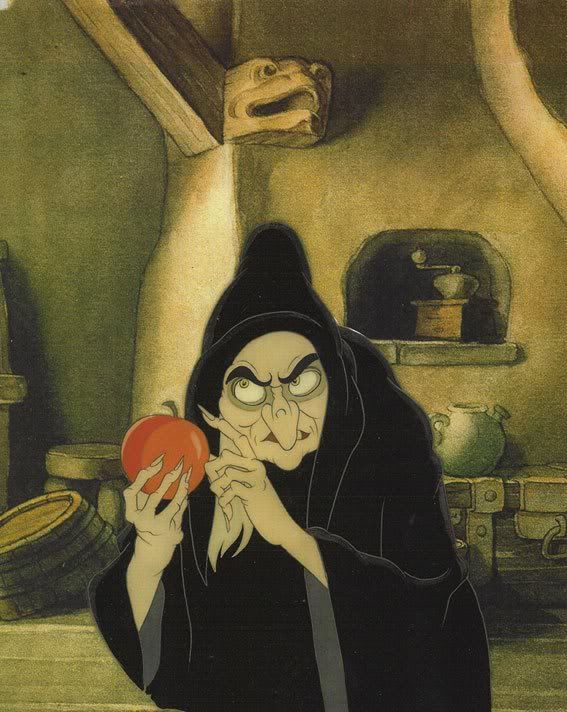
The Queen is the perfect example of pride gone too far. The more pride a person has, the easier it is to be insulted, and the more drastic measures a person will take when it inevitably happens. Bonds can be broken over minced words. Relationships shattered over misunderstandings. Hatred bred from differing opinions.
Vanity, the obsession with appearance and an offshoot of pride, is just as unhealthy. It can lead to anorexia. How many people have seen fights break out between teenage girls because of shallow things like looks? Too much pride is a horrible thing, and the Queen proves it.
The Queen also gets one of the best deaths in a Disney movie. After getting cornered on a cliff in a rainstorm, she tries to start an avalanche. It doesn't quite work out. First, she's struck by lightning. Then she falls off a cliff. Then she's crushed by a boulder. We also get a look at a couple nearby vultures, and they look like they're about to dive right in for a little snack.
Envy - Scar
The Lion King, 1994
"One makes himself get good things by jealousy, while the other does not allow his neighbour to have them through envy." -Aristotle
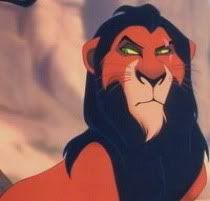
A good way to sum to up. Envy goes hand-in-hand with greed. It is an obsession with something, likely material or trivial in nature, that drives a person to want it. Envy, however, takes that concept one step farther by driving resentment toward a person who has been endowed with the things that the envious want. For example, a greedy person wants wealth; and envious person would hate somebody who alread has it.
It's not limited to money, however. People can be envious of somebody else's lifestyle, their wife, their looks, and in the case of Scar from the Lion King, their kingdom. Envy is a very shallow in nature, driving ill-feelings over something insignificant. It also has a lot of room to escalate. When a person becomes too envious, things can get drastic. They can steal, they can hate.
Sometimes, they can even kill.
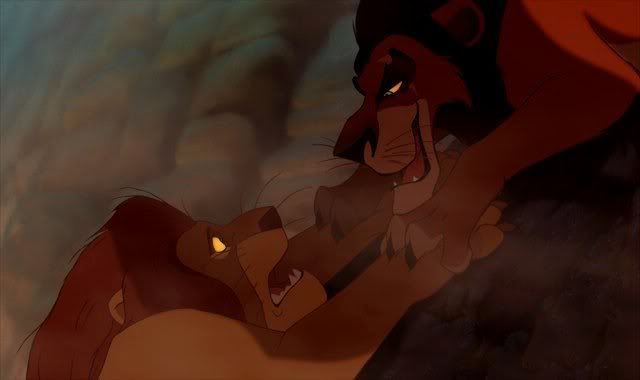
The Pride Lands are ruled by a monarchy of lions. The role of king is passed down from father to son. When the previous king ended his reign, he passed the title on to Mufasa, planting the seeds of envy into the heart of Mufasa's brother Scar, who got no such honor. We can imagine how Scar's jealousy grew over the years. Mufasa became a well respected king, loved for his leadership and praised for his wisdom.
When Simba was born, Mufasa gained an heir to take on the throne, completely snuffing out any chance of Scar ever getting a turn. Fueled by jealousy (wanting to rule the Pride lands) and envy (not wanting Mufasa and Simba to rule them, due to the hatred that has cooked up inside of Scar's soul over the years,) and with nothing left to lose, Scar incites an insurrection. He murders his brother and blames it on the young Simba, shaming him into leaving forever.
Scar is dastardly. A true villain. His is kineiving and manipulative. He thinks only for hiimself. He is willing to stoop to any level, even murder, to get what he wants. Scar also shows cowardice at a couple points, though he is quick to cover it up. You can see it in his snarl. Scar is so wicked that when he takes control, even the earth itself becomes desolate until Simba comes to reclaim the throne. And it is all because of envy. Let his actons be a warning to us: envy can bring out the worst in people, and cause your downfall.
Wrath - Syndrome
The Incredible, 2004
Anger is something we're all familiar with. It's a common human emotion and we feel is every day. It's part of being what we are. Anger is raw. Any word I could use to describe it would just be a fancy way of saying it. When anger touches us, it glosses over descency and common sense. Something that isn't pretty flares up inside of us, like a monster awoken by whatever insult has been cast upon us.
Wrath is anger to the extreme. It is also, in my opinion, the most dangerous of the seven deadly sins. It is something that resides in every single one of us. It's as natural as breathing. Unlike the others, which we can have, may or may not have, which are character flaws, anger is something exists. It can not be destroyed, it can only be controlled.
Wrath is a form of hatred. While the other deadly sins can spawn hatred, or come from hatred, wrath IS hatred. A gritty state of a wickedness. The fact that it has potential in the hearts of all of us makes it even more scary. It evokes wicked actions with ease, and paves the way for a deed built out of hatred and cemented with wrath: revenge.
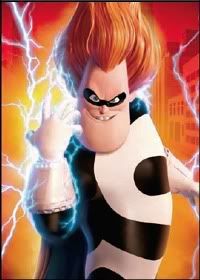
Syndrome may not be the coolest villain ever. He's not badass, he's not cool looking. In fact, he's rather ugly. While Syndrome is a criminal mastermind and a remarkably adept foe, he doesn't possess a lot of the qualities that other, more popular villains do. Let us not mistake his lack of cool for a lack of evil.
In the beginning of the film, a young boy comes of superhero Mr. Incredible and asks to be his sidekick. Mr. Incredible snuffs him, being that he is too young and only has piddly inventions and no super powers. This turns out to be Mr. Incredible's greatest mistake, as he inadvertently creates his own worst enemy.
The young boy broods on the rejection. Instead of letting it slide, he creates a super fortress. He invents devices and weapons that no military could dream of. He revolutionizes science. And he does it all in the name of revenge. Syndrome devotes his entire life to destroying Mr. Incredible. With is capabilities, he could cure the world of all evil, bring peace and revolutionize society as we know it.
He doesn't. Mr. Incredible invokes a relentless anger inside of Syndrome, which Syndrome embraces to its fullest. He casts aside everything but the prospective to get back at the one who snuffed him so long ago--to unleash his wrath upon Mr. Incredible.
When he gets his chance, Syndrome captures and tortures Mr. Incredible. He puts him through physical pain, as well as mental and emotional horror whil he torments Mr. Incredible's family. When he's finished getting his kicks, he unleashes an unstoppable robot upon civilization that even he loses control of. When the Incredibles escape and save the day (including Syndrome's own life,) he still doesn't give it a rest.
Blind with rage, Syndrome continues to persue the family by capturing the baby. It's a fatal mistake; the baby's powers manifest and Syndrome is killed. He fights to the very end. Wrath caused Syndrome to wreck is future, to hurt others, to show no mercy, and drove him to his death.
Villains are wicked. They fight the heroes, they fight against morals and righteousness. They are driven, one way or another, against what is good. Disney villains are great examples of villainy.
Unfortunately, these aren't relegated to fiction. Bad guys and evildoers are reflections of true faults within humanity. Whether accurate and realistic, or a characature, villains in fiction exist because the elements of them exist within us all, in the form of the seven deadly sins and otherwise. With this knowledge, we can study them for our own flaws. To hopefully make ourselves better people and avoid becoming the thing we love to hate.
Thanks for taking the time to read all of this. I hope you enjoyed it and found it educational, and that it wasn't too philosophical. I know it's long, so if you've made it this far, you have my utmost gratitude. God bless, and thanks for giving me your time.
I enjoyed your post and the correlation of deadly sins with Disney characters. This brought it to a more everyday and relate-able level for kids.
ReplyDeleteI enjoyed your post and the correlation of deadly sins with Disney characters. This brought it to a more everyday and relate-able level for kids.
ReplyDelete